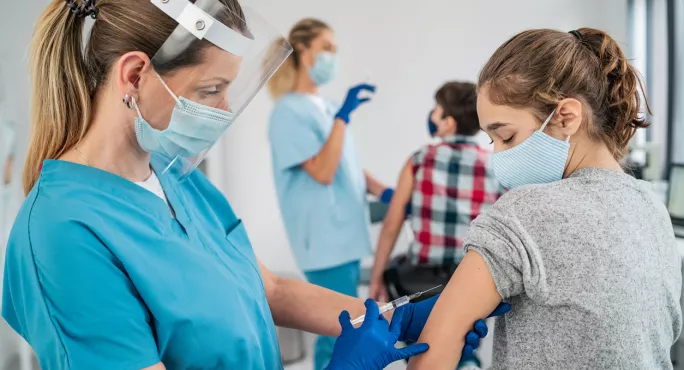Heads urged to promote vaccine for pupils aged 12 to 15

The government is urging schools who are waiting to host Covid vaccinations to encourage parents to get 12- to 15-year-old pupils jabbed elsewhere, amid concerns about low take-up.
It comes as a new poll shows more than half of parents do not believe 12- to 15-year-olds should receive a second dose of the Covid-19 vaccine.
The Department for Education has called on schools to promote the vaccine to parents after admitting that only half of pupils in the age group have had the jab so far and in some parts of the country the proportion is even lower.
In an email to headteachers, seen by Tes, the department says: “Vaccines remain our best weapon against this virus. We have seen uptake increase nationally to 50.6 per cent, however, there is substantial variation between regions.
“Therefore, whilst waiting for confirmation of an on-site visit from a SAIS (School Age Immunisation Service) team, we encourage schools to continue signposting parents to book out-of-school vaccinations for their child, if aged 12 or over, through the NHS booking system.”
It comes as a poll published today by Parentkind shows 61 per cent of parents of secondary school pupils do not agree with pupils aged 12 to 15 being given two doses of the Covid vaccine.
The survey, of more than 2,000 parents across England in January, also suggests the majority do not support the idea of pupils wearing masks in school.
Three in five (60 per cent) of parents said they disagree that pupils should wear face coverings in class “for the foreseeable future”.
The findings come after pupils returned to class last week following the Christmas break, with new advice for secondary school and college students in England to wear face coverings in classrooms.
It suggests 52 per cent of parents disagree with the government’s recommendation that 12- to 15-year-olds should receive a second Covid-19 jab.
The NHS opened bookings for the age group in England to get their second jab in December - and experts urged parents last week to book vaccinations for pupils as schools returned.
Parents are also divided on the idea that vulnerable 5- to 11-year-olds should receive the coronavirus vaccine - as recommended by the Joint Committee on Vaccination and Immunisation (JCVI), the survey suggests.
Only around two in five (42 per cent) parents agree that clinically vulnerable 5- to 11-year-olds, or those in this age group living with clinically vulnerable people, should receive the first dose of vaccine.
The poll also reveals divided opinions among parents on whether twice-weekly Covid testing of children at home should take place to help reduce the risk of transmission, with 52 per cent disagreeing and 45 per cent agreeing.
But a point of unity was reached on the issue of the damaging impact of the pandemic on education, with 79 per cent of parents saying they are concerned about it.
Meanwhile, 70 per cent said they are not satisfied the government’s current level of support for schools will limit the disruption to their child’s education.
John Jolly, Parentkind chief executive, said the data shows that nearly two years into the pandemic, there is “clearly a long way to go” to persuade parents that their child’s education will not take “a long-term hit”.
He said: “Although measures such as the use of face coverings, vaccinations for children and testing are, perhaps inevitably, polarising, the overall sense we are getting from parents is that a majority want their child’s educational experience to return to some form of normality as quickly as possible.
“Clearly, a challenge to that will come in reconciling the divide in parents’ views of the best way to achieve this, particularly when it comes to the role of protective measures against the spread of Covid.”
Geoff Barton, general secretary of the Association of School and College Leaders, said: “Schools and colleges are following the government’s guidance on students wearing face coverings in classrooms and communal areas but will not want to do so for any longer than is absolutely necessary, as they can make effective learning more challenging.
“Vaccinations for 12- to 15-year-olds have been a divisive subject but are one of the very few ways we have of controlling the spread of the coronavirus in schools and colleges.
“Whether or not individual children receive vaccinations is obviously a decision for their parents.”
The DfE email to heads says it is estimated that a 60 per cent vaccine uptake among healthy 12- to 15-year-olds will reduce confirmed cases of Covid in this group in the period by 33 per cent by the end of March.
This equates to a reduction of 110,000 absent school days in this age group due to confirmed Covid-19 cases, the department adds.
It also says research shows that those who do become infected three weeks after receiving one dose of the Pfizer-BioNTech or AstraZeneca vaccine are between 38 per cent and 49 per cent less likely to pass the virus on to their household contacts than those who are unvaccinated.
You need a Tes subscription to read this article
Subscribe now to read this article and get other subscriber-only content:
- Unlimited access to all Tes magazine content
- Exclusive subscriber-only stories
- Award-winning email newsletters
Already a subscriber? Log in
You need a subscription to read this article
Subscribe now to read this article and get other subscriber-only content, including:
- Unlimited access to all Tes magazine content
- Exclusive subscriber-only stories
- Award-winning email newsletters
topics in this article



